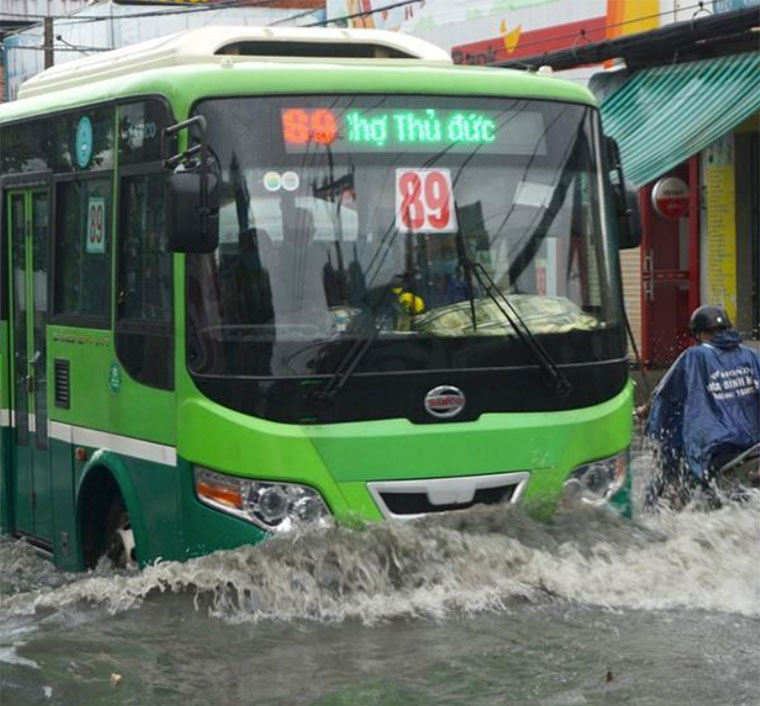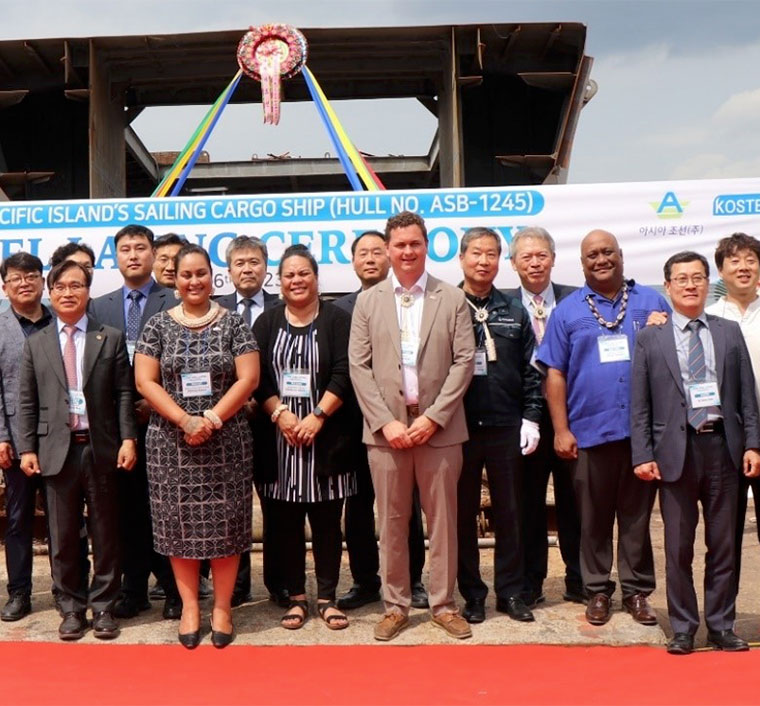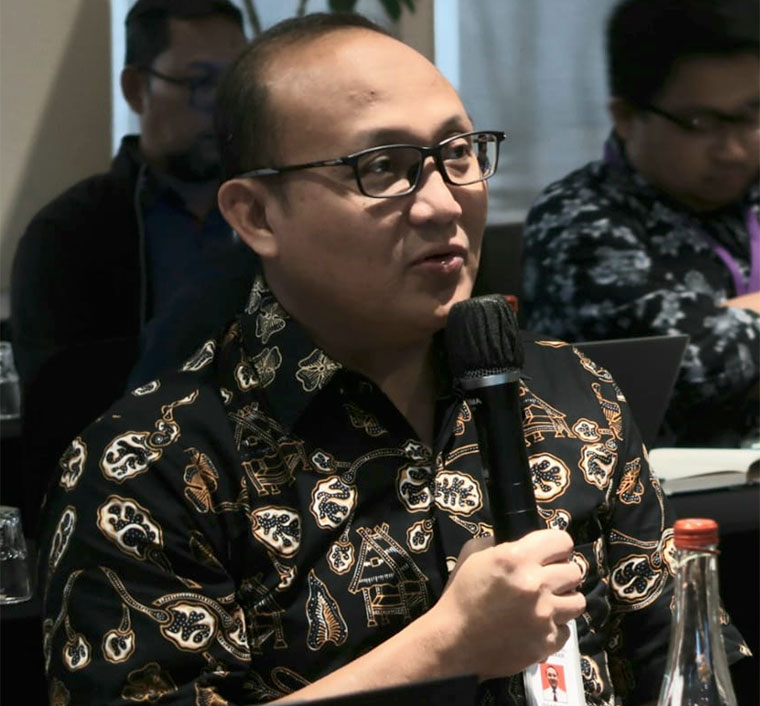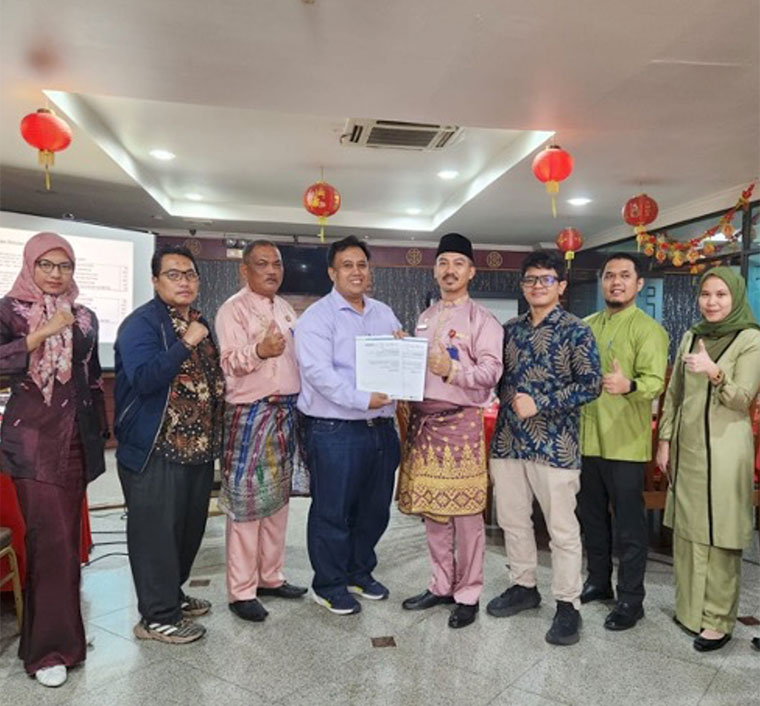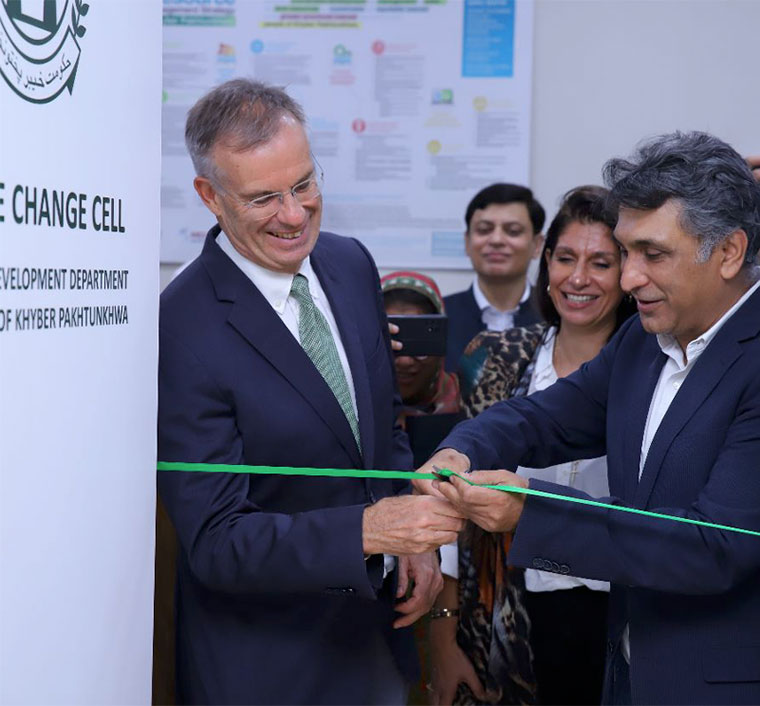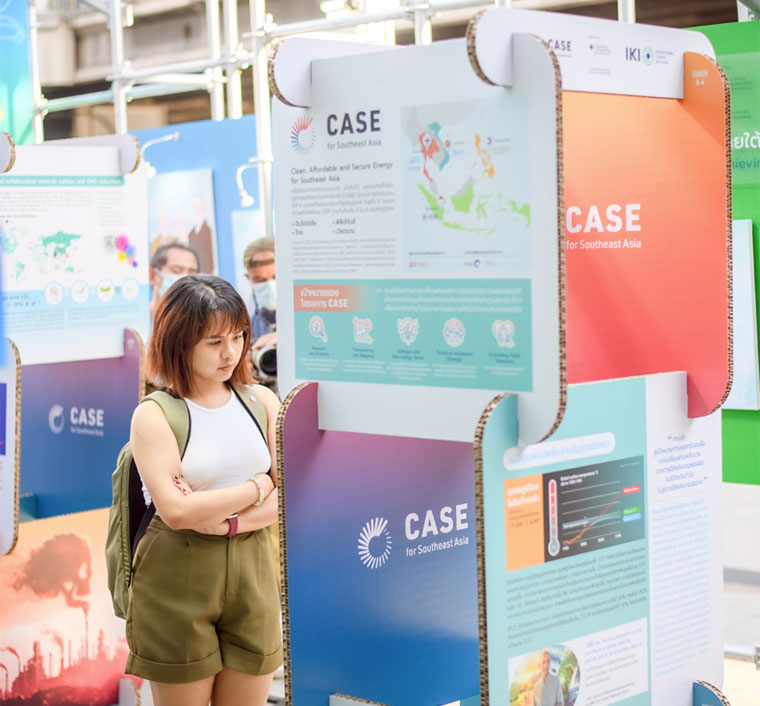
Issue 10, August 2023

CLICK HERE TO SUBSCRIBE YOUR EMAIL TO OUR MEMBER LIST
SPOTLIGHT FROM SECRETARIAT
Welcome to TUEWAS newsletter!
Our newsletter is all about bringing you the latest updates and insights filled with informative articles on knowledge sharing, publications, completed and upcoming events, and more from our members across projects in regional countries. Our aim is to enrich your knowledge and keep you informed about the latest trends and developments. Thank you for all your contribution to this newsletter.
For the design and compilation of this newsletter, we have a new colleague on board in the SNRD AP and TUEWAS Secretariat. Please warmly welcome our new team member Natasha!
Warm regards,
Raghu, Donaya, Khaekhai, Natasha

Raghu Babu Nukala

Donaya Siamwalla

Khaekhai Tanasansopin

Natasha Krisanalome
SPOTLIGHT FROM SECRETARIAT
Letter of Director of Department APLAC
Dear APLAC colleagues,
Today I am addressing all of you in Asia, Pacific, Latin America and the Caribbean and sending you warm greetings from Eschborn!
We are now in the middle of the year and our dynamic and innovative sector is buzzing as usual. Our figures clearly show how active you were in the 1st half of the year. Cash management is going well – thank you for that! Please continue to keep up the good work so that we can achieve a solid result together at the end of the year.
A few weeks ago, I was able to see the intensity and resilience with which our colleagues on the ground are driving innovations with our partners in Vietnam and Indonesia. Feeling their commitment, heart and soul on the ground shows me anew the importance of our work. It is exciting to see how topics are implemented in an integrated way: In Vietnam, for example, vocational training/TVET is being combined with climate approaches. Moreover, I was also to visit the Dominican Republic and Mexico last week, where I was able to get to know various projects in the field of climate change, tourism and cooperation with the private sector. I am impressed to see how we are improving the situation on the ground for the local population
creating new sources of income and at the same time better protecting the regions from extreme weather events. In addition to exchanging ideas with partners and GIZ colleagues, I was also able to help with a mangrove reforestation and take part in the Climate Finance Festival in Mexico City!
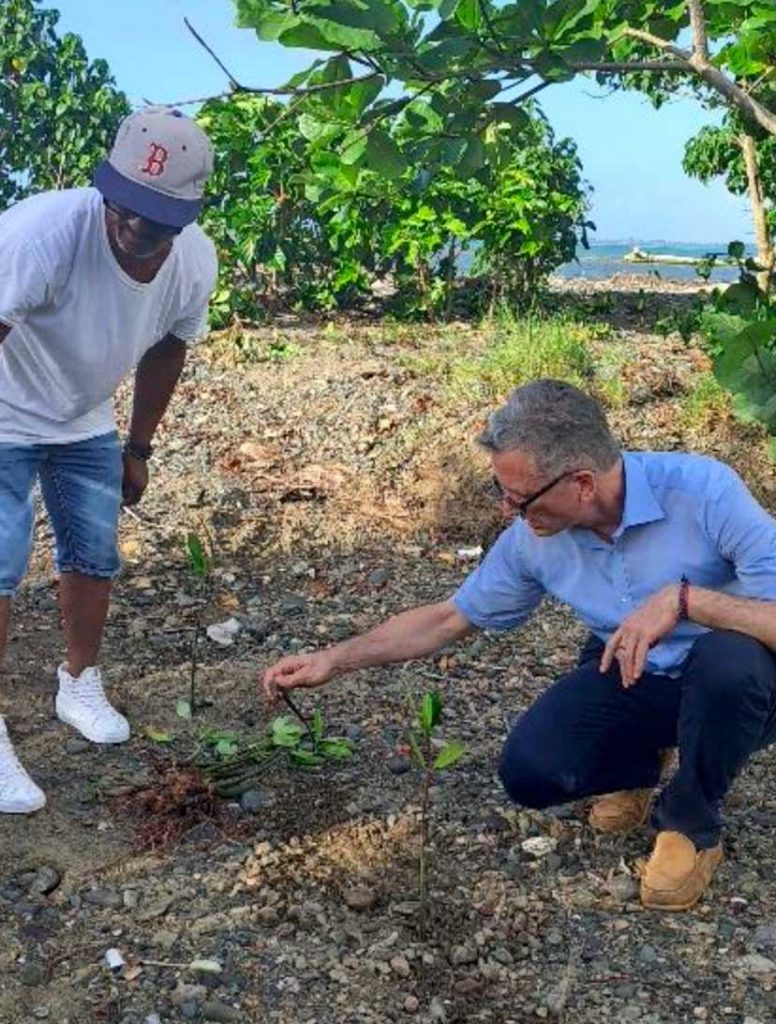
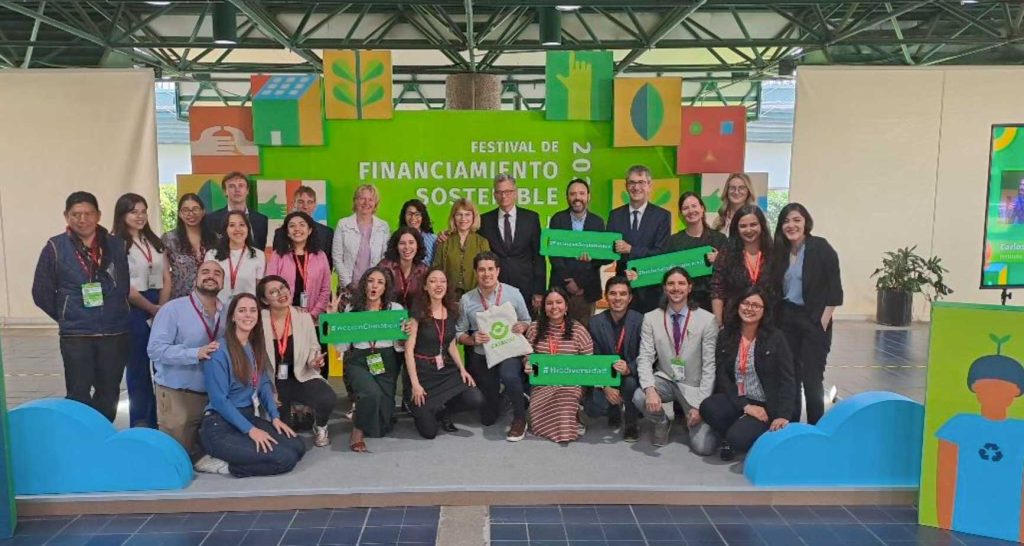
And it is not only me who is traveling, but also many of the German ministers, state secretaries and other governmental representatives who are visiting our regions. I am sure that you have noticed it already: Germany and the EU are increasingly interested in cooperating with Asia and Latin America. Due to the changed geopolitical situation, alliances with partner countries are to be further strengthened. The political attention paid to our regions shows us that we can only tackle global challenges together with our partner countries. And even if our partners and clients do not always agree, we as GIZ can often help build bridges and promote dialogue.
Back from the stage of global politics to our everyday work, from which I know that the shoe often pinches in the countries when it comes to digitalization. Precisely for this reason, I would like to share very good news with you: With the rollout being completed
in early July 2023, Common Portal 2.0 will support administrative processes as a digital solution in more than 95 GIZ partner countries worldwide and significantly simplify communication between country offices and project offices in the field structure. The original version programmed by a small team of developers in the country office in India has been further developed in collaboration with APLAC and DIGITS. I am proud that this technical solution was developed in our department, and I am sure that Common Portal will relieve your daily work in the countries For me, the keyword innovation is one that characterizes our APLAC department. Therefore, I am particularly proud that over 100 colleagues from APLAC submitted more than 50 contributions to the GIZ Innovation Fund on various topics such as Just Transition and feminist development policy.

Digital Capacity Development with atingi: Empowering Learners Worldwide
The word “atingi” originates from Esperanto, meaning “to achieve something.” It’s a fitting name for the GIZ project, which aims to support young people from partner countries in German development cooperation to succeed in their professional endeavors. To achieve this goal, atingi offers an innovative e-learning platform that provides free, locally relevant learning content. With just a computer, tablet, or smartphone, learners can access over 450 courses, significantly enhancing their prospects in the local job market. This accessibility is particularly crucial as internet access continues to grow globally.
atingi collaborates with local partners from Africa, Asia, and Latin America to create its learning content. As part of the Global Programme Digital Transformation, the project works with various companies, organizations, and institutions from business, civil society, science, and politics, such as the Smart Africa Initiative of the African
Union or the International Telecommunication Union (ITU). The Moodle-based platform is also language-friendly, supporting over 100 languages, making it suitable for e-learning in many regions around the world.
Commissioned and funded by the German Federal Ministry for Economic Cooperation and Development (BMZ) and implemented by GIZ in 2019, atingi serves as an effective and free way to provide diverse learning materials. The target audience includes learners aged 16 and above, such as students, job seekers, and entrepreneurs across different sectors. Since its inception, atingi has been instrumental in promoting access to learning content in developing countries, including reaching out to disadvantaged groups such as girls, women, and those residing in rural areas. So far, the platform has benefited over 710,000 learners, highlighting its positive impact on capacity development worldwide.
Moreover, atingi actively engages with more than 340 global partners who appreciate its readily available technical infrastructure, ease of implementation, and the support provided by the atingi team. Regardless of whether you wish to publish a self-paced web-based training or a tutored online course, atingi offers various options for digital capacity development.
This opportunity extends to international development projects, organizations, and partners in German development cooperation countries, enabling them to leverage atingi for digital learning without any cost. Furthermore, they can tap into the existing partner network and freely accessible content to bolster their initiatives.
In conclusion, the atingi e-learning platform is a valuable tool that empowers learners worldwide. By harnessing the potential of digital technology and fostering collaborations, atingi bridges the gap between learning and opportunity. With atingi, learners can unlock their full potential, paving the way for a brighter future for themselves and their communities.
If you are also interested in using atingi for your project, don’t hesitate to reach out!
Learn more on our IDA page here
You have question or would like to get in touch? Email us at help@atingi.org
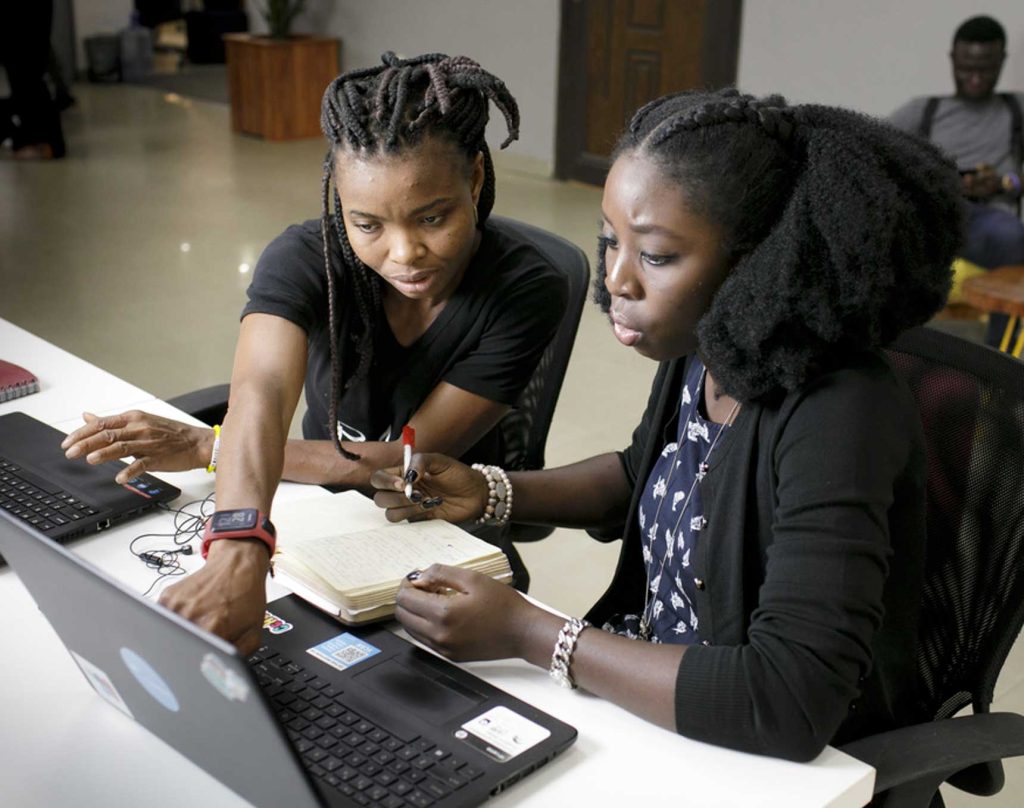
HIGHLIGHTS AND KNOWLEDGE SHARING
The global project “Go Circular” commissioned by BMZ has started its work in Viet Nam within the cluster for Sustainable Economic Development at the end of 2022, and it was just extended until June 2025.
Green hydrogen utilisation in Indonesia is predicted to show an increasing trend, particularly in the energy and transportation sectors. With its abundant potential, Indonesia also has a great opportunity to lead the hydrogen market in Asia-Pacific region. However, strategic preparation is required, including the formulation of policy and regulation as well as ensuring readiness of production technology and infrastructure.
DOCUMENTS AND PUBLICATIONS
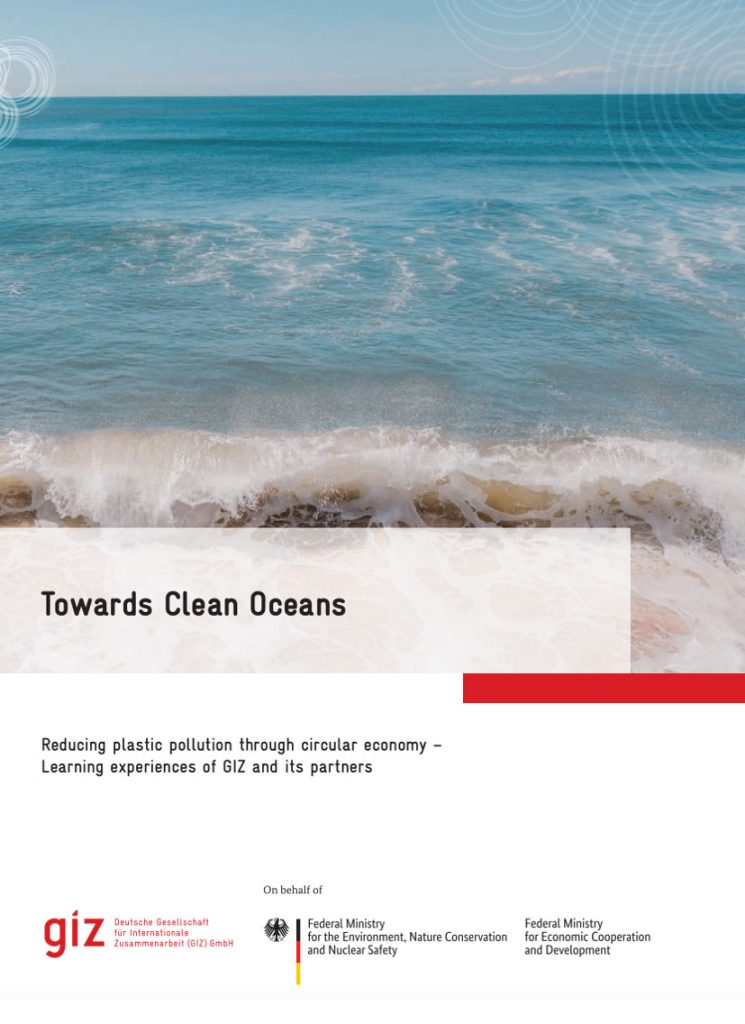
Towards Clean Oceans: Reducing Plastic Pollution Through Circular
This report takes stock of the various experiences within the GIZ portfolio on marine litter prevention and plastic management. It provides lessons learnt, tools and recommendations for the way forward.
Key buzzwords
#plastic, marine litter, waste management, circular economy
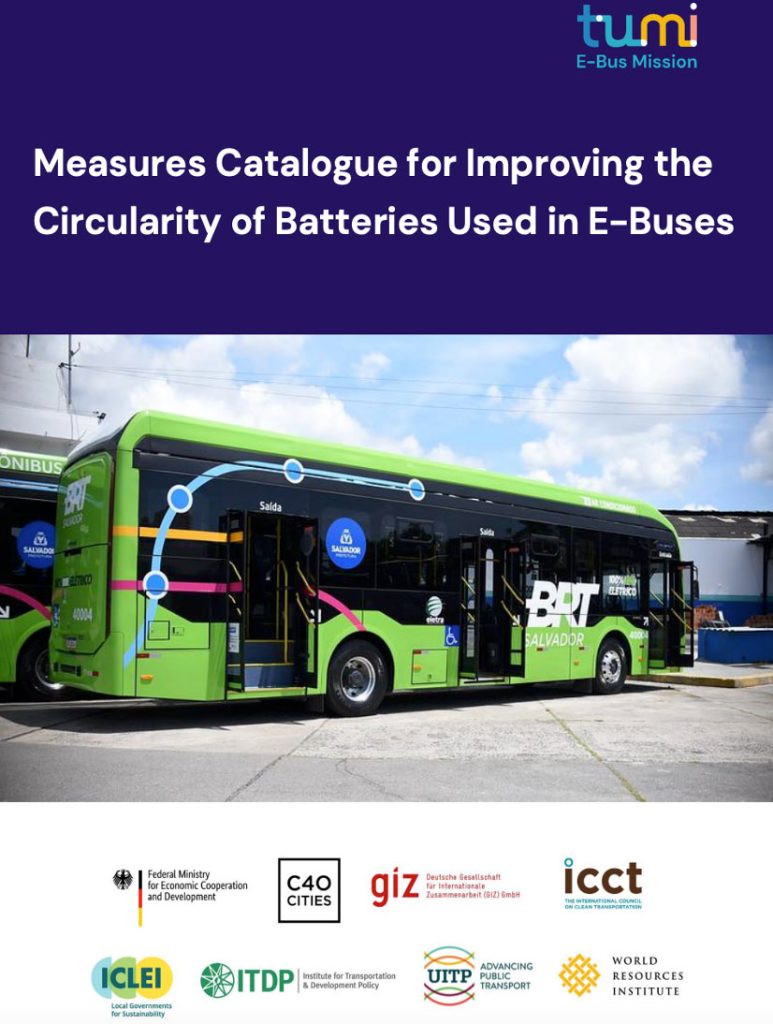
Measures Catalogue for Improving the Circularity of Batteries Used in E-Buses
The TUMI E-Bus Mission launched the Measures Catalogue for Improving the Circularity of Batteries Used in E-Buses. The catalogue is designed to be a practical guide for policy makers and procurement practitioners to address the needs of policy formulation, procurement tendering, maintenance, and sound end-of-life (EoL) management of E-bus batteries.
Key buzzwords
#Circular economy, electric buses, procurement, electric mobility
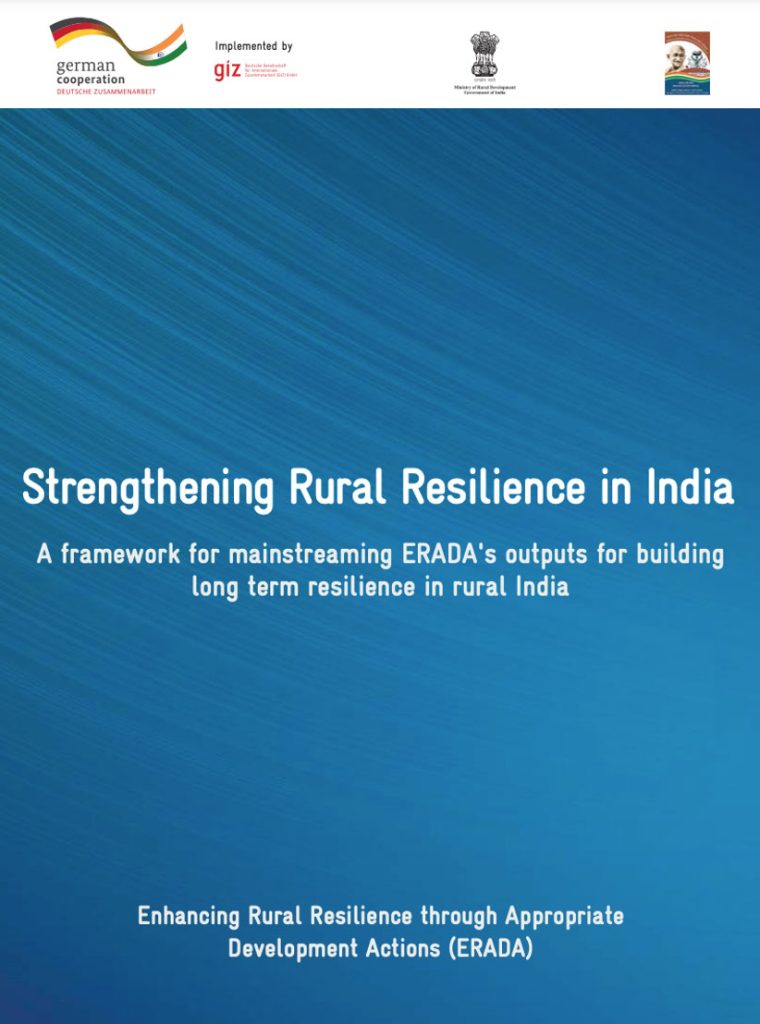
Strengthening Rural Resilience in India
A framework for mainstreaming ERADA’s outputs for building long term resilience in rural India.
Key buzzwords
–
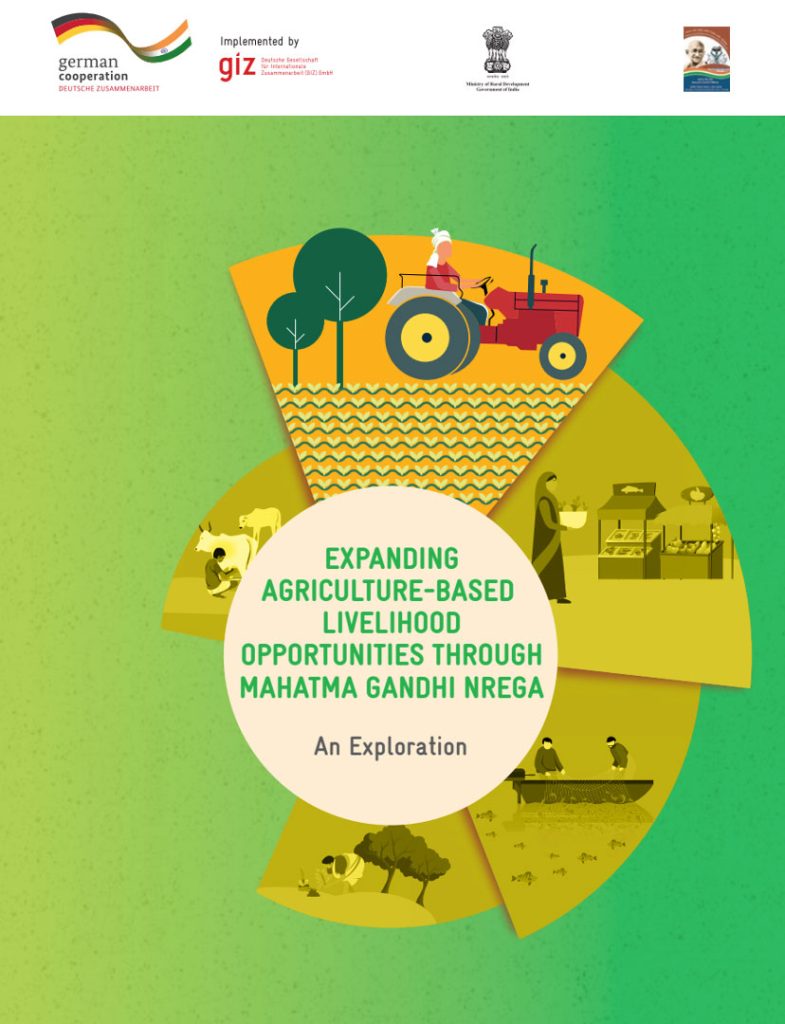
Expanding Agriculture-Based Livelihood Opportunities Through Mahatma Gandhi Nrega
The study report titled as ‘Expanding Agriculture-Based Livelihoods Opportunities through Mahatma Gandhi NREGA: An Exploration’ is conducted to map the existing livelihood activities from the current list of 262 permissible activities under the Mahatma Gandhi NREGA and other related livelihood activities along with relevant departments and schemes that can be applied in the four project states.
Key buzzwords
–
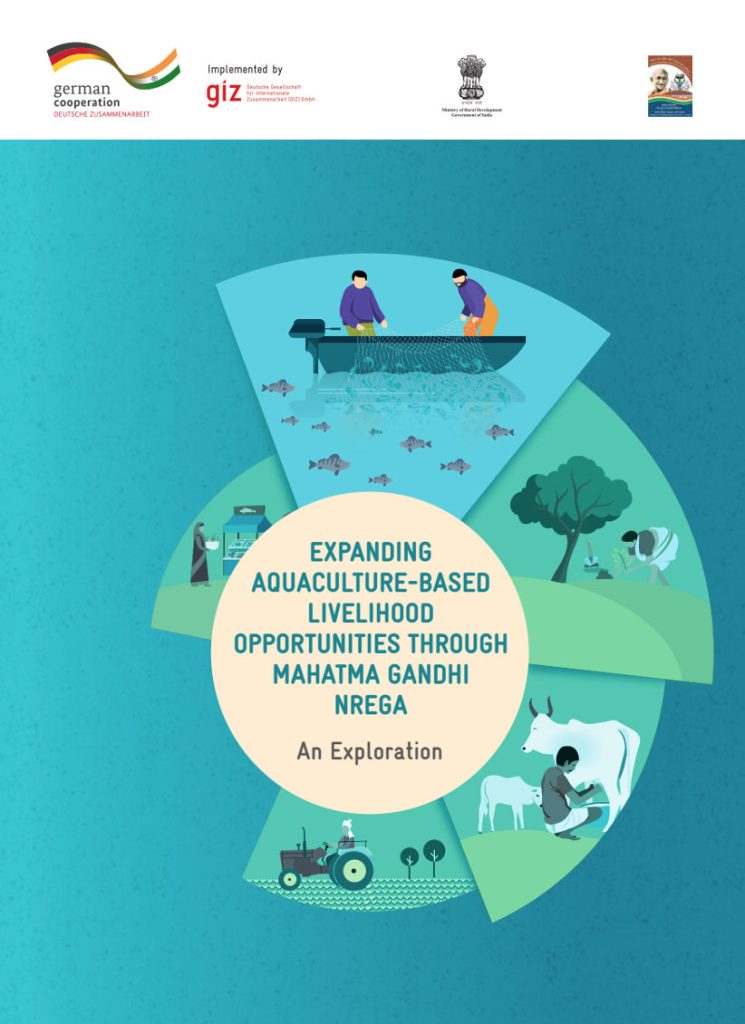
Expanding Aquaculture-based Livelihood Opportunities Through Mahatma Gandhi Nrega
This report aims to highlight the potential under the Mahatma Gandhi NREGS programme for expanding aquatic livelihood through convergence with other flagship programmes. The report focuses more on the potential impacts to create aquatic livelihood, noting merely the heterogeneity across states and that in many states the implementation of the programme needs to adopt different localised strategies.
Key buzzwords
–
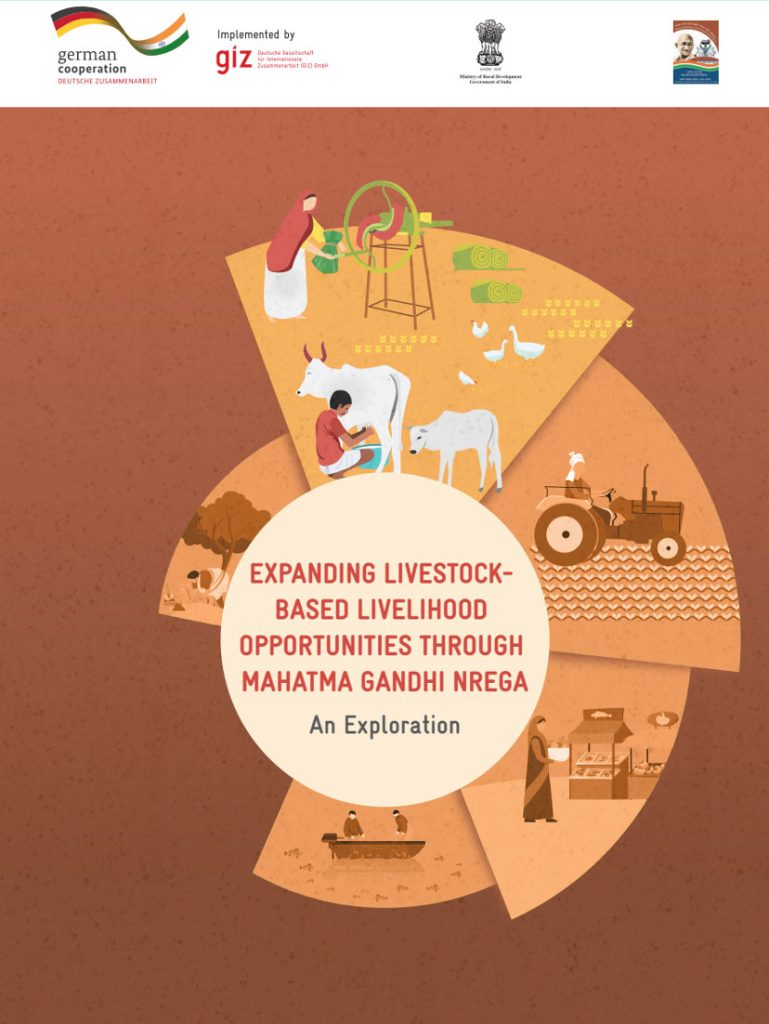
Expanding Livestock-Based Livelihood Opportunities Through Mahatma Gandhi Nrega
The objective of this report is to map existing livelihood activities from list of activities under Mahatma Gandhi NREGA and activities which have potential for creating enabling infrastructure for livestock-based livelihoods in rural and tribal areas.
Key buzzwords
–
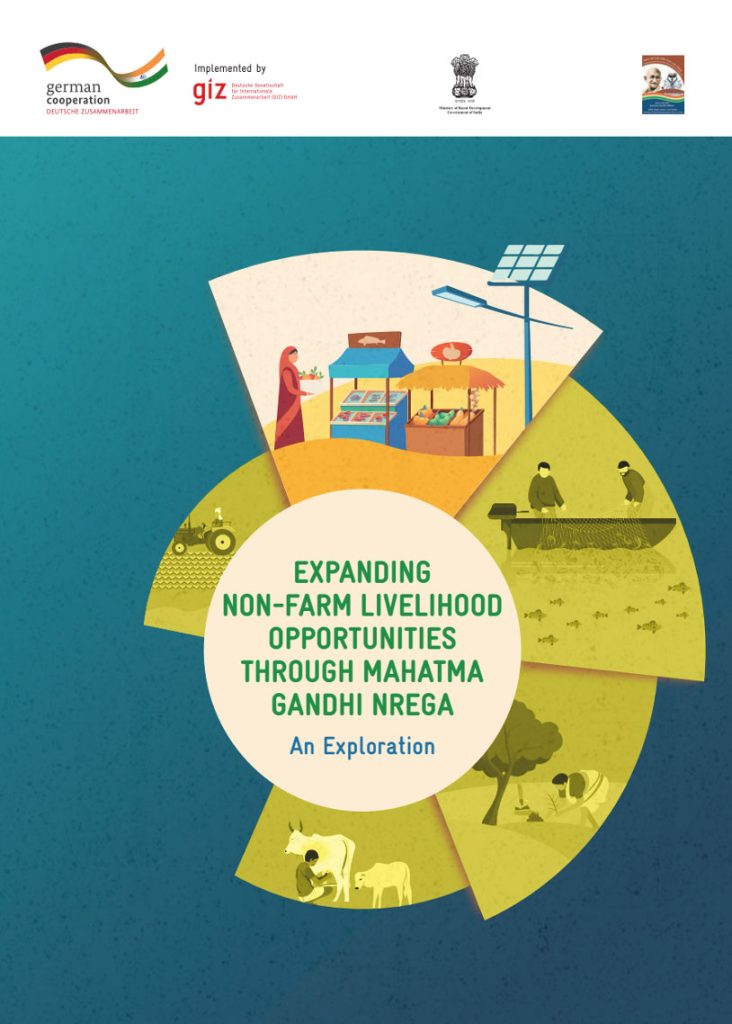
Expanding Non-Farm Livelihood Opportunities Through Mahatma Gandhi Nrega
This report is divided into six sections which elaborates the RNFS scenario in India with a focus on Mahatma Gandhi National Rural Employment Guarantee Scheme (Mahatma Gandhi NREGS) and covers case studies of various non-farm models demonstrated across ERADA project states namely Bihar, Jharkhand, Madhya Pradesh and Rajasthan. It aims to respond COVID19 induced economic shocks in rural areas by strengthening the livelihoods of vulnerable communities, based on locally available natural resources and development support programmes.
Key buzzwords
–
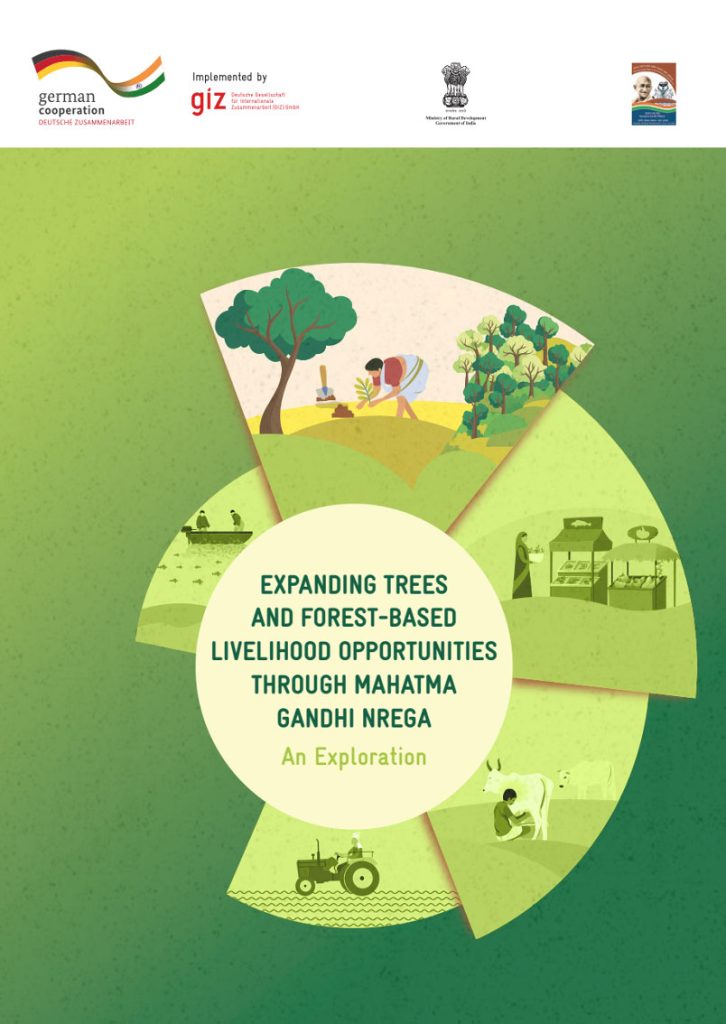
Expanding Tree and Forest-Based Livelihood Opportunities Through Mahatma Gandhi Nrega
The study is done for the Indo-German development cooperation project “Enhancing Rural Resilience through Appropriate Development Actions (ERADA)” for the purpose of identifying the best suitable interventions from existing schemes of the Ministry of Rural Development, Government of India, State Governments, and public agencies. The study focused on mapping of the schemes and interventions, specifically trees and forest based, that could possibly be put in fray for implementation of the project ERADA rather than conducting experimentation as part of new interventions.
Key buzzwords
–
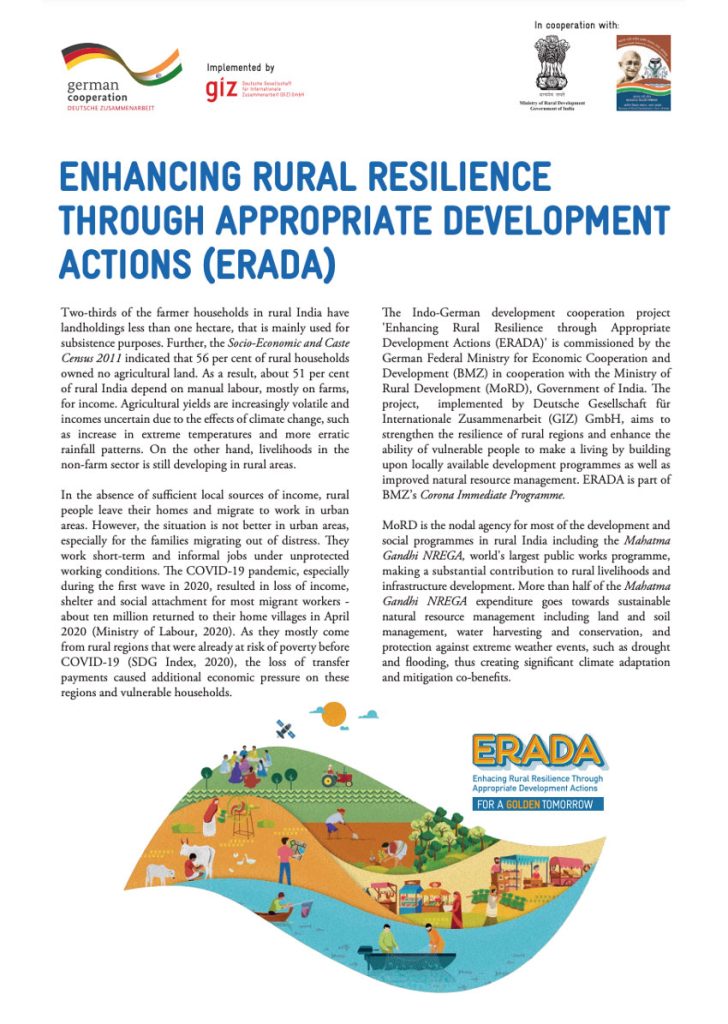
Enhancing Rural Resilience Through Appropriate Development Actions (ERADA)
The project, implemented by Deutsche Gesellschaft für Internationale Zusammenarbeit (GIZ) GmbH, aims to strengthen the resilience of rural regions and enhance the ability of vulnerable people to make a living by building upon locally available development programmes as well as improved natural resource management.
Key buzzwords
–

A Just Transition Toolbox for Coal Regions
A Just Transition Toolbox for coal regions is centred around five main themes: strategy, governance, energy, industry and employment, and is designed explicitly for practitioners in coal regions – policymakers in regional administrations, people working in or for ministries and other stakeholders who are or want to be involved in a transition process. It features a broad range of examples of current practices in coal regions, including their strengths and shortfalls, as well as links to further resources and external knowledge.
Key buzzwords
#coal, coal transitions, industry transition, just transition, renewable energy, strategy development, sustainability, sustainable employment
EVENTS, TRAININGS AND WEBINARS
COMPLETED EVENTS
10 May 2023 I Online Zoom
20 April 2023 I Hybrid
15 May 2023 I Hanoi, Viet Nam
15 June 2023 I Germany
24 June – 2 July 2023 I Germany and Belgium
13 July 2023 I Ho Chi Minh, Viet Nam
1 June 2023 I Hanoi, Viet Nam
22 May 2023 I Hybrid in Bali, Indonesia
2023 I Bali, Indonesia
27 July 2023 I Chennai, India
18-20 July 2023 I Manila, Philippines
OTHER GIZ NEWSLETTERS
GIZ International Forestry Policy Newsletter – Subscribe now to get news and updates on GIZ International Forest Policy. If you would like to receive the GIZ International Forest Policy Newsletter, please send a message to forests@giz.de
Indo-German Biodiversity Programme – Indo-German Biodiversity Programme Newsletters
Renewable Energy and Energy Efficiency Programme II (REEEP II) Newsletter – Subscribe to get news and updates on Renewable Energy and Energy Efficiency Programme II of GIZ Bangladesh. To receive the newsletter, please send an email to Ananya.rubayat@giz.de
PM GatiShakti Newsletter – Coverage of activities supported by Green Freight project in the PM GatiShakti Newsletter. Please refer to Page 3 to read about Urban Mobility India session and CII summit of Post-harvest logistics infrastructure.
Useful Links and Platforms
AdaptationCommunity.net – The Global Programme Human Mobility in the Context of Climate Change (HMCCC) have launched a global website, a subpage on Climate Change and Migration under the AdaptationCommunity.net. Please click the link for an introduction to the topic of climate change-induced human mobility, publications, and other resources. The global programme operates in the Pacific Islands, the Philippines and the Caribbean, and is supported by a team in Bonn.
GIZ Philippines Facebook Page – Get updated on GIZ Philippines and Pacific
GIZ Thailand Website – Learn about GIZ Thailand activities and other updates
SNRD Asia and The Pacific Website – Sector Network Natural Resources and Rural Development Asia and the Pacific
SNRD Africa Website – Stay informed what is happening with our sister network
Engage with TUMI’s threads on TUMI’s Twitter
Deutsche Gesellschaft für
Internationale Zusammenarbeit (GIZ) GmbH
Registered offices
Bonn and Eschborn, Germany
193/63 Lake Rajada Office Complex 16th Fl.
New Rachadapisek-Rama 4 Road,
Klong Toey, Bangkok, 10110 Thailand
E tuewas@giz.de
I www.tuewas-asia.org
Bangkok 2023
Unsubscribe:
Send us an email to snrd-asia@giz.de to unsubscribe.
Editor:
TUEWAS Secretariat, Bangkok
Design:
Sector Network Coordination Unit, Eschborn
TUEWAS Secretariat, Bangkok
Photo credits/sources:
As shown under each pictures
URL links:
Responsibility for the content of external websites linked in this publication
always lies with their respective publishers.
GIZ expressly dissociates itself from such content.
GIZ is responsible for the content of this publication.


